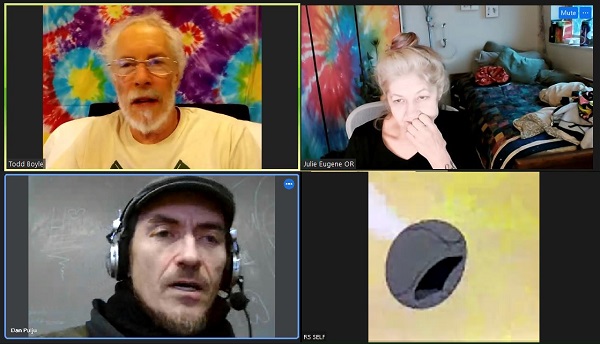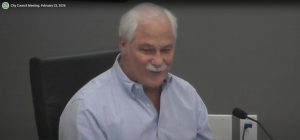A People’s State of the City 2024: Loss of local media is degrading our civic life
8 min read
In addition to the official ‘State of the City’ from the mayor, we’re sharing several People’s versions of the State of the City 2024. Here are thoughts from producers at KEPW.
Todd Boyle: Every year about this time in early January, there are the ‘State of the City’ proclamations from our political leaders: what buildings have been built, you know, and moving the city hall out to the EWEB complex, and the progress renovating different parts of town with the urban renewal funds.
They are not really reaching the core of the problem. Because, if you want to ask, ‘What is the state of the city,’ that goes to the condition of the people of the city. The roads have to be maintained, but that is not really the essence of what is the well-being of the people of the city.
[00:00:43] And so I’m just going to come right out and say that it’s the condition of the mind and the intellect of the people, and it has been degraded by the takeover of all of our major media, the newspaper, and this has terrible consequences on any city when they lose their local media.
[00:00:59] And so the state of the city is not good. It’s rather disastrous and it’s getting worse all the time. And that is because of the condition of the state of consciousness, political and intellectual development of the people of Eugene, and it’s the fault of the political leadership in our city and our state.
[00:01:21] Richard Self: An example of this was the incident that happened at Dizzy Dean’s Donuts, you might remember, where a young homeless woman got doused with water by the owner on purpose. And it was a bias crime. It was against the law in more ways than one. There was other incidents that just happened to pop up like that in other places across the country.
[00:01:46] In Louisiana, for example, there was another employee at a supermarket who did the same exact thing, and then walked back in the door and was immediately fired by the manager of the supermarket. And he said, ‘That’s not how we treat people.’
[00:02:03] So, unlike that, that didn’t happen here. The owner is the owner of Dizzy Dean’s Donuts, and apparently he walked back in and laughed with his employees after throwing water on the homeless woman.
[00:02:15] I don’t know. It seems like the city doesn’t have the political will—regardless of patting themselves on the back—they don’t have the political will to actually do stuff because they hear so much from the other side. They hear from, well, they hear from the money.
[00:02:32] And so you have things that are still happening regardless of any U.S. District Court decisions or regardless of any other laws or anything. People are still getting woke up at two and three and four in the morning and being told to get out. (Yep.) ‘Do you know where the Walmart is on West 11th?’ ‘Yeah.’ ‘You find that, you just keep going, you understand?’ That’s what I was told one night being woke up in a park. Absolutely, in those words.
[00:03:07] And so, and I thought after being an advocate for a while and working on everything, that those things would subside, but I still hear from the homeless all the time about being told to get out, leave town. And this comes from the animus from the other side that doesn’t want things to move forward in helping the homeless.
[00:03:34] Todd Boyle: And this goes right to the character of the people of Eugene, which is, as many small towns, is selfishness and a certain mean-spiritedness, which hasn’t been challenged in Eugene here.
[00:03:45] Julie Lambert: It’s true, Todd. This is so true.
[00:03:48] John Q: The late homeless activist Eric Jackson, in his last public forum, said rousting the homeless in the winter and telling them to move took five to 10 years from his life.
[00:03:59] Julie Lambert: And so this is what we’re up against… We were honoring one of our, you know, he was an activist’s activist. He was one of the best. I love him so much. And—
[00:04:17] Richard Self: And I’ll jump in with what Julie was telling me earlier about all of this. Yeah, that’s exactly what we’re up against. But it’s always, you know, ‘Look at all this trash, look at this mess these people are making.’ When I can and do, I confront these people, in saying, ‘What are you doing to help? Do you go over there with a trash bag and maybe do something about it?’ Because I never hear that, whereas I hear advocates doing that all the time.
[00:04:49] The main body of the Human Rights Commission is fighting with the city, telling them before you enact any more policies, especially those policies that have to do with the homeless, we want to be in on those discussions before you enact those policies, not afterwards, and then you want to get our input. The Human Rights Commission is fighting to actually get/have some input before.
[00:05:17] That fire that I have, I have that fire from the day I became housed—that everybody needs to be experiencing what I’m experiencing. That is the fire I live with every single day and go to sleep with every single night. It comforts me to know that there are some people now that are not sleeping in the cold because of The Nell and the other token places that have been put up. It comforts me to know that they’re—it’s fewer people not enduring the long night, but at the same time, there’s still the same problems.
[00:05:56] Dan Pulju: The city is a mess. The city of Eugene is a mess. It looks like a mess to anyone who drives through, the same way that Portland does. And the simple fact of the matter is that Eugene’s economy has been neglected by its elected officials.
We don’t really have a major employer besides the U of O. The rents are too high, and there are not enough good jobs, and they haven’t been preventing the urban blight from creeping along and turning our city into a hellhole.
[00:06:28] Part of the problem, when it comes to homelessness, is that besides being an economic problem, there’s a sociological element to where homeless people become alienated and become a sort of underclass.
[00:06:41] And the reason I bring that up is that the solution that gets talked about all the time, and it’s usually front and center, is housing. But I see a cultural issue here also, where the unhoused are somehow seen as lesser people and as being a lower social caste. Is it possible to address that? I’m not saying I have the answer, but I’m trying to ask the question: Why do we treat people who are on the streets right now as if they were aliens from another planet?
[00:07:15] Richard Self: My sister from another mister, Anna, says: ‘Why can’t Egan (Warming Center) volunteers also be from the homeless population?’ It’s a good question. I think that’s just another way to keep your thumb on the homeless people.
[00:07:30] It’s again, not looking at things from the perspective of those you’re trying to supposedly ‘help.’ If you’re going to help somebody, then you need to look at it through their eyes, not through yours. And that’s where we run into a problem with people who enact or write up these policies.
[00:07:51] Kelly McIver has no experience whatsoever being homeless. He doesn’t, but he makes policy. And that’s true about every person that’s involved in policy.
[00:08:04] We end up being a nuisance, just a surface nuisance to the people who make decisions.
[00:08:11] Todd Boyle: Yes, and many public officials, when they find themselves in charge of a program, they actually find out from their superiors, that they’re not exactly hired to have opinions, and that they actually are hired to be an apparatchik for the operation of a policy that is formed amongst the movers and shakers of Eugene.
[00:08:33] And there is such a thing as the movers and shakers in Eugene, and just like that guy said, ‘It’s a big private club and you ain’t in it.’
[00:08:43] There actually is a big club of insiders that we have no visibility of because it’s all secret and private. And they decide what’s real and what matters and what doesn’t matter.
[00:08:53] So basically what we need to have a conversation with these power interests who are opaque to the public—the establishment of Eugene, the opaque and old families of timber interests and so forth—to verbalize the policy actions of the city that we already see, but which are unspoken, the unspoken policy, which is to marginalize and push out homeless people (for one obvious example), and not to build public housing, which is needed in every city in the Western world, except Eugene, apparently.
[00:09:28] You have to have public housing, you know, if you have 10,000 people who are never going to be able to pay the rent ever, ever, ever, it’s never going to happen, then they have to have public housing.
[00:09:41] Dan Pulju: Do we want to become a big city with all these classic big city issues? And I’ve watched that happen for the past 30 years and it never really seemed to me that there was any conscious decision or any public decision even made by the people of the city that they wanted the city to grow that big.
[00:10:06] I think a lot of it has been driven by the U of O. The U of O has just relentlessly wanted to get bigger and expand. And I find it, I find it odd that a public university would place such a high emphasis on that. I remember Kevin Hornbuckle, who used to be on the city council, talking about what he called the Los Angeles-ization of Eugene.
[00:10:28] And, of course, economically, no one has another answer for prosperity than to grow, to grow bigger, to increase the city infrastructure and become a big city. Of course, not all cities do that. And some cities have to take a different route.
[00:10:43] Residents of Eugene, we don’t really seem to have direct enough control of the economic fate of our city, of these decisions, to really have any significant input.
[00:10:55] When the public gets put in the position of not having direct enough control to make these decisions, it has to waste all its energy and all its creativity on reacting and fighting these uphill battles where it takes 100 people to reverse a decision made by one person. As a resident of Eugene, I have not had that level of control or that level of input.







